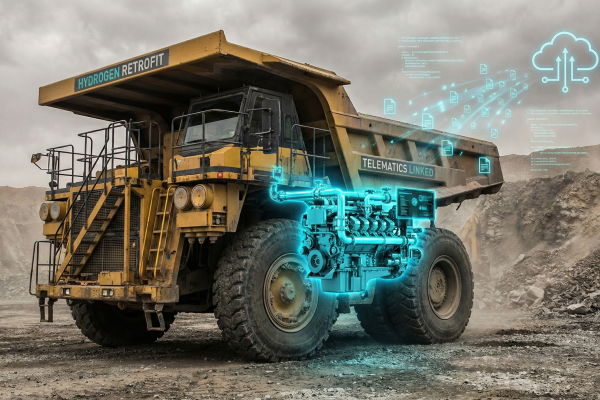March 12th, 2025 | 07:00 CET
Nel ASA, First Hydrogen, Volkswagen – The EU and Germany are pumping billions into hydrogen – who is cashing in?
As the global search for alternatives to oil and gas gathers pace, hydrogen could become the secret star of the energy transition. Green hydrogen could become a game changer not only for factories but also in the transport sector. The EU has now launched a multi-billion funding program – in Austria alone, 112,000 tons of green hydrogen are to be produced with it, and in Lithuania, 13,000 tons. One thing is clear: from 2027, it will be noticeably more expensive at the gas station. Experts expect price jumps of between 38 cents and 1 euro per liter. Suddenly, many are looking again more closely at emission-free drives. Innovative companies are driving this technology forward and positioning themselves as pioneers of an emission-free era. Opportunities are opening up for investors. Those who invest in hydrogen players early on could benefit from the upheaval in the energy and automotive industries. But which companies are setting the trends?
time to read: 5 minutes
|
Author:
Armin Schulz
ISIN:
NEL ASA NK-_20 | NO0010081235 , First Hydrogen Corp. | CA32057N1042 , VOLKSWAGEN AG VZO O.N. | DE0007664039
Table of contents:

"[...] dynaCERT's HydraGEN™ device offers a retrofit solution for diesel engines designed to protect the environment while providing economic benefits. [...]" Bernd Krueper, President & Director, dynaCERT Inc.
Author
Armin Schulz
Born in Mönchengladbach, he studied business administration in the Netherlands. In the course of his studies he came into contact with the stock exchange for the first time. He has more than 25 years of experience in stock market business.
Tag cloud
Shares cloud
Nel ASA - Between political debate and industrial reality
In Germany, the steel industry is currently igniting the crucial question of climate policy. CDU leader Merz is making it complicated: On the one hand, he demands "green hydrogen must come," on the other hand, he warns against rushing: "If we act hastily now, we will flatten entire plants - and with them thousands of jobs." Conversely, the coalition government is taking a very different approach: Scholz and Habeck are insisting on a rapid transition and want to use state aid to help. Merz counters critical questions with a jab: "As long as there are no alternatives for defense contractors, no plant will be shut down here." The balancing act between climate targets and economic interests remains a tightrope walk.
Despite challenging conditions, the Norwegian hydrogen pioneer Nel ASA continues to expand. Recently, the US subsidiary received an order for 2 PEM electrolysers with 5 megawatt capacity worth USD 7 million from a US steelmaker. This shows that industrial customers want to gradually switch to green hydrogen. However, the financial figures for Q4 2024 illustrate the gap between ambition and reality. Although EBITDA improved to NOK -36 million compared to NOK -78 million in the previous year, the PEM division remains a problem child with a loss of NOK -22 million. Order intake rose moderately by 13%, but inventory shrank by 23% year-on-year.
Nel is planning drastic cost-cutting measures for 2025. Investments are to be halved and production capacities adjusted. The Company wants to benefit from EU and US subsidies of over USD 300 million. The alkaline segment, which saw a 15% increase in sales in 2024, shows that scalable technologies can be profitable while PEM serves niche projects for the time being. CEO Håkon Volldal is looking to the future, anticipating rising demand and seeing his company as well-equipped to meet it. However, the last major order dates back to January. At the current share price of NOK 2.02, the Company still has a high market capitalization of around EUR 285 million.
First Hydrogen - Strengthens European presence with German subsidiary
On March 10, 2025, First Hydrogen announced the establishment of its wholly-owned subsidiary, First Hydrogen GmbH, in Germany. The step underscores the European expansion strategy of the Company, which has already completed over 6,000 test kilometers under real-world conditions with hydrogen-powered commercial vehicles in the UK, generating exclusively positive feedback. In particular, the range of more than 630 km is noteworthy here. Germany serves as a key market. With a planned EUR 19 billion hydrogen network by 2032 and a possible EUR 500 billion special fund for infrastructure, the region offers ideal conditions. For CEO Balraj Mann, it is clear that First Hydrogen can help implement the hydrogen strategy, especially when it comes to producing green hydrogen.
Germany currently covers only a fraction of its hydrogen needs from domestic production. By 2030, demand is forecast to reach 95-130 terawatt hours annually, of which 50-70% will have to be imported. The government's new import strategy relies on partnerships, pipeline expansion, and derivative-based transport. At the same time, a 9,040-kilometer core network is to be created to connect industrial centers. For First Hydrogen, this opens up opportunities to build scalable supply chains – particularly through the use of modular technologies such as small modular reactors (SMR).
These SMRs are considered game changers. Not only do they produce low-carbon electricity, but they also enable decentralized hydrogen production regardless of the weather. First Hydrogen is currently examining the use of these reactors, which the EU considers sustainable. The advantages are obvious. These include lower transport costs through local production, stable energy supply, and synergies with power grids. The model is attractive for investors because it combines long-term energy policy with short-term scalability, which is ultimately a key to the decarbonization of industry and transportation. The stock is currently trading at CAD 0.375, giving it a market capitalization of CAD 27.6 million.
Volkswagen – Electric ambitions and financial discipline
Volkswagen is setting a clear course in the highly competitive automotive market. With a new e-model for EUR 20,000, which is to be available from 2027, the Company aims to make electric mobility suitable for the masses. A demo vehicle will be presented as early as March, which is also a signal to investors. At the same time, VW is pushing ahead with the development of the Scalable Systems Platform (SSP), which is to serve as the technological basis for various models in the future. These steps underline the goal of becoming the leading volume manufacturer of affordable e-vehicles by 2030.
Despite a 3.5% decline in sales to 9 million vehicles in 2024, group revenue remained stable at EUR 324.7 billion. Operating profit fell by 15% to EUR 19.1 billion but adjusted for special items such as restructuring costs. Otherwise, the figure would have been EUR 21.7 billion. The commercial vehicle subsidiary TRATON shone with an operating margin of 9.2% and an increased dividend, while Porsche Holding had to absorb write-downs. As a result, the stock initially rose.
For 2025, VW plans a revenue increase of up to 5%, with the operating margin expected to fluctuate between 5.5% and 6.5%. The group is reducing its capital expenditure from EUR 180 billion to EUR 165 billion for the period up to 2029 and is focusing on partnerships, such as with Rivian in software development. At the same time, the workforce at the core brand will be reduced by 35,000 jobs by 2030. The challenges remain: geopolitical tensions, trade barriers, and volatile commodity markets will continue to require agile crisis management. If the transformation is successful in the long term, higher share prices than the current EUR 112.35 are also possible.
The billions in subsidies for green hydrogen are accelerating the energy transition, but companies are taking different paths. Nel ASA is balancing between orders, such as the USD 7 million electrolyser deal, and financial challenges, while cost-cutting measures are designed to ensure future viability. First Hydrogen is focusing on decentralized generation with a German presence and modular SMR technology to close Europe's import gap. Meanwhile, Volkswagen is combining electric ambitions, such as the EUR 20,000 model, with strict cost discipline despite margin pressure. For investors, the hydrogen market remains a mix of opportunities and risks. Here, investors should pay particular attention to the valuations of the individual companies.
Conflict of interest
Pursuant to §85 of the German Securities Trading Act (WpHG), we point out that Apaton Finance GmbH as well as partners, authors or employees of Apaton Finance GmbH (hereinafter referred to as "Relevant Persons") may hold shares or other financial instruments of the aforementioned companies in the future or may bet on rising or falling prices and thus a conflict of interest may arise in the future. The Relevant Persons reserve the right to buy or sell shares or other financial instruments of the Company at any time (hereinafter each a "Transaction"). Transactions may, under certain circumstances, influence the respective price of the shares or other financial instruments of the Company.
In addition, Apaton Finance GmbH is active in the context of the preparation and publication of the reporting in paid contractual relationships.
For this reason, there is a concrete conflict of interest.
The above information on existing conflicts of interest applies to all types and forms of publication used by Apaton Finance GmbH for publications on companies.
Risk notice
Apaton Finance GmbH offers editors, agencies and companies the opportunity to publish commentaries, interviews, summaries, news and the like on news.financial. These contents are exclusively for the information of the readers and do not represent any call to action or recommendations, neither explicitly nor implicitly they are to be understood as an assurance of possible price developments. The contents do not replace individual expert investment advice and do not constitute an offer to sell the discussed share(s) or other financial instruments, nor an invitation to buy or sell such.
The content is expressly not a financial analysis, but a journalistic or advertising text. Readers or users who make investment decisions or carry out transactions on the basis of the information provided here do so entirely at their own risk. No contractual relationship is established between Apaton Finance GmbH and its readers or the users of its offers, as our information only refers to the company and not to the investment decision of the reader or user.
The acquisition of financial instruments involves high risks, which can lead to the total loss of the invested capital. The information published by Apaton Finance GmbH and its authors is based on careful research. Nevertheless, no liability is assumed for financial losses or a content-related guarantee for the topicality, correctness, appropriateness and completeness of the content provided here. Please also note our Terms of use.




